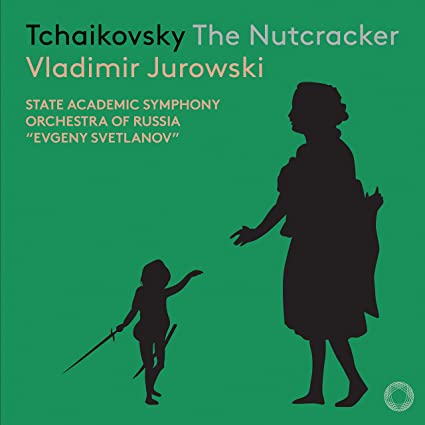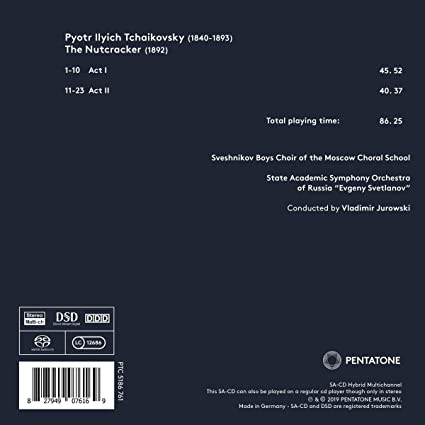Finally - a modern (digital) Nutcracker for the ages. Jurowski goes straight to the top of the list.11/28/2021 I have in my collection every commercially available stereo recording of The Nutcracker ever to appear on CD, to the best of my knowledge. It (along with Mozart's Flute Quartets) is one of those pieces I just must possess in every iteration that comes along. Each year I scan the new release lists for the latest recording(s) of it, eager to treat myself to a shiny new disc for Christmas, hoping to find that perfect performance of it. But alas, I am disappointed with most of them.
I have a hard time with recordings of Tchaikovsky's beloved Nutcracker. I know the score inside and out (and have attended numerous live performances and have even played it myself) but I'm just never satisfied. I find new recordings of this masterpiece deficient time after time, with regard to tempos and dynamics, or a lack of imagination, or unsatisfactory recorded sound quality, or, most often, with readings which are merely routine and mundane. I have a few favorites which I turn to year after year, though. - Two classic accounts from the early days of stereo continue to amaze (both in playing and recorded sound): Dorati's 1962 LSO reading for Mercury (especially in the 2005 remastering for SACD), and Rodzinksi's incomparable 1958 Royal Philharmonic recording for Westminster (remastered in 2001 by DG in stunningly good sound.) - There are two from the height of the analog era, one providing a richly Romantic, warm-hearted experience: Andrew Davis in Toronto (1979, CBS/Odyssey); and the other is probably the best all-around version ever recorded: Dorati (again), this time with the Concertgebouw in 1975 for Philips. - Surprisingly, I have just two completely satisfactory choices from the digital age, neither of them very recent - Slatkin in Saint Louis (1985, RCA) and Ozawa in Boston (1990, DG). Both benefit from the advantages of digital technology with clean, dynamic sound within a big, spacious hall, yet revealing much inner detail and vivid orchestral colors. While DG's acoustic in Boston lacks a little in sumptuousness, RCA's for Slatkin positively glows. Both are excellent readings, full of life, strong characterization, inspiration and fabulous orchestral playing. (A lot of folks regard Gergiev's 1998 Philips recording with the Kirov Orchestra as being the definitive single-disc recommendation. I remember it being energetic and vivacious, but at just over 80 minutes, quite rushed and rather lacking in charm. I also distinctly remember the recorded sound being a bit brash and unrefined, including a completely unnecessary, jarring, woofer-splitting, full-volume shotgun blast in the Battle scene. Good grief!) Finally, at long last in 2019, comes arguably the greatest one of all - from a master interpreter of Tchaikovsky, Vladimir Jurowski, in stunning multi-channel SACD sound from Pentatone. I was completely enthralled with it. Where do I even begin? Let's start with the basics. The printed score. If you're a competent conductor, with sufficient musical understanding and a vision and sense of imagination, you should be able to make this score magical. And yet, in recording after recording over the past 30 years, I hear conductors who seem to be dutifully fulfilling some contractual obligation to record it and sound bored (usually) or in a great big hurry to get it over with (frequently) or weigh it down with symphonic seriousness (as a last resort). Or, with nothing interesting to bring, they try ever so hard to "say" something, without infusing an ounce of inspiration into it, and instead set out to "do" something to make their "interpretation" interesting or relevant. One of my biggest pet peeves is a very common - and infuriating - tendency among today's crop of conductors: the propensity for inserting unmarked f-subitopiano-crescendos into a passage to drive home a climax. Simon Rattle's recording for EMI comes immediately to mind as being one of the worst offenders, but there are many others. Another pet peeve is to mess around unnecessarily with tempos - play this passage so slow it crawls to a stop, and that passage so fast it is breathless and hectic. Tchaikovsky knew exactly what he was doing and it's all right there on the printed page for a conductor to reveal. This score is so full of wonderment and magic, the music practically speaks for itself without self-indulgent "help" from a conductor. With just the slightest bit of inspiration and insight (and a willingness to actually care about it), this score can come to life. Such is the case with Valdimir Jurowski. Nowhere does he deviate from the score. Nowhere does he set out to "make a point". He simply makes music. And he faithfully expresses the very essence of this glorious score. Tempos everywhere are perfectly judged. He moves along when the music needs it and relaxes beautifully to allow a melody to soar. And everywhere he succeeds at creating wonderment and magic, plenty of drama, and moving musical expression. What's more, the music positively glitters with delight. His orchestra is fully engaged every step of the way to provide it for him. With thoroughly committed involvement from everyone, the score comes to life thrillingly from beginning to end. There is no denying Jurowski has the ultimate benefit of superlative orchestral playing. I truly have never heard the score played better than here by the State Academic Symphony Orchestra of Russia. They do not sound as if they're on autopilot. They do not sound as if they're sight-reading. They do not sound bored out of their minds. And with that, they are instantly better in this score than almost every other orchestra which has recorded it. These musicians play with a joy and invigoration almost entirely missing from most recordings. They sound thoroughly involved and supremely accomplished. I admit to being a bit hesitant going in, this being a Russian orchestra and all. But I needn't have worried. Long gone are the days of braying brass and thin, screechy violins. Quite the contrary actually. These strings produce some of the most sumptuous, luxurious, richly singing sounds you'll hear from any orchestra anywhere. And the brass are golden rich and dramatic. Everywhere the orchestral colors are vivid and richly saturated - helped by the gorgeous recorded sound, which is among Pentatone's very best ever. As purely orchestral music, Jurowski impresses at every turn. Again, tempos are everything in this score. And hearing his reading, one wonders how anyone can play it differently. It sounds just so very right. But there's more. There are countless instances of inner details brought to the fore (not unnaturally, just interestingly) which had me grabbing the score time after time. And the dramatic scope of the piece flows effortlessly from section to section, with sweeping musical lines lifted aloft throughout. The music is never weighted down with symphonic heaviness. This is a ballet after all - and sounds like it in Jurowski's hands. He and his orchestra make this music positively sparkle with life in a way rarely heard on record, complete with exuberant percussion and tingling bells and whistles. Just a few details are worth pointing out. Right off the get-go, after a very sprightly Overture, the Decoration of the Christmas Tree (more commonly, "the entrance of the guests" - track 2) is bustling with merrymaking. Folks are eager to attend this festive holiday event. And later in Grandfather's Waltz (tr. 6), the tempo swirls along so infectiously one can envision the entire cast dancing away the evening, having a grand time. And later, in Departure of the Guests (tr. 7), there is a sense of anticipation that is positively palpable. And sure enough, in the next section, (The Magic Spell Begins), and into track 8 (The Battle), magic really does happen. And miracles come to life. The festivities continue on, enchanting and captivating throughout the night. And when we at last arrive at the famous "characteristic dances", characterization becomes another important aspect of this performance. And the solo playing from this fantastic orchestra shines. All through this reading there is a sense of magic and anticipation which so marvelously captures the essence of the Christmas season - the feeling that something wonderful is about to happen. With dozens of recordings of it at my disposal, I've listened to this score so many times I often find myself thinking, "oh not again"; and yet Jurowski had me on the edge of my seat with rapt anticipation. There is no better word for it. Taken as a whole, this isn't just a symphonic exposition; it's a story. And what a storyteller Jurowski is! Each scene is brought brilliantly to life with vivid characterization and dazzling playing from every section of this orchestra. And all the while, Tchaikovsky's rhapsodic tunefulness is given full reign, with ardor and grandeur aplenty. There are so many instances I could site, but for just one example, listen to the gorgeously singing strings in The Dance of the Prince (tr. 20). Simply ravishing. Now just a couple technical details to mention before I go. - Jurowski splits his violins left and right, and everywhere that is advantageous. There are so many instances where the sound bounces back and forth in the most ear-catching, tantalizing way - proving yet again what a master orchestrator Tchaikovsky was - and also what a magnificent recording Pentatone provides. - There is one oddity, though: the missing tambourine in Coffee - Arabian Dance. It simply is not there for the entire scene and I can find no justification for omitting it (not in the score, nor is there any mention of it in the booklet). Finally, it is significant that the producers managed to squeeze this entire recording onto one disc. At over 86 minutes, that is absolutely incredible! The convenience alone is invaluable, but it also allows it to be offered at a nice price too. I also really like how the booklet identifies each track with a descriptive scenario in the storyline, rather than the official score titles (such as "scene", "galop" or tempo indications) as does the Chandos booklet for Jarvi. I'm anxious to listen to this wonderful recording again. (Perhaps I'll wait until closer to Christmas.) And I am eternally grateful it was recorded before Pentatone began cutting back on producing multi-channel SACDs. If there was ever a demonstration-worthy example of the higher-resolution format's capabilities, it is this recording of Nutcracker. This one has it all. Superb orchestral playing. Superb recorded sound. Superbly unfussy yet supremely musical, imaginative, lively and thoroughly inspiring direction from the podium. I found the entire performance wondrous, enchanting and thrilling. I finally have found the perfect Nutcracker. It is simply magnificent in every conceivable way.
0 Comments
Leave a Reply. |
Proudly powered by Weebly


 RSS Feed
RSS Feed